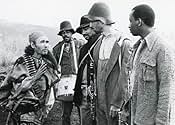Agrega una trama en tu idiomaShipwrecked African-American slaves arrive in the midst of Bakumatsu-era Japan; they soon carve out a niche in the market with their musical talents.Shipwrecked African-American slaves arrive in the midst of Bakumatsu-era Japan; they soon carve out a niche in the market with their musical talents.Shipwrecked African-American slaves arrive in the midst of Bakumatsu-era Japan; they soon carve out a niche in the market with their musical talents.
Fotos
- Dirección
- Guionistas
- Todo el elenco y el equipo
- Producción, taquilla y más en IMDbPro
Argumento
Opinión destacada
My initial reaction was, this sure is one strange movie. Set in the late 19th century and after the end of the American Civil War, three slaves decided to make their way back to Africa, but en route, found themselves on the shores of Japan after a shipwreck. From then on, it's a weird mix of Japanese shogun intrigue and jazz music fused into a somewhat nonsensical end.
The introduction needed a little getting used to, since the Americans were clearly speaking in English, but had their speech dubbed over with voices speaking Japanese. Subtitles and intertitles became Japanese at certain points of the story, although English subtitles were used when they had their voices dubbed. So it's listening to two concurrent language tracks, and reading the English subtitles.
The storyline and its characters were peculiar as well. Essentially, it's about the chancing upon a group of gaijins who bring along their musical instruments and talent for jazz (well, actually not quite. They only know one song, and it's played ad nausem after plenty of practice), and sharing their passion for music with the native Japanese. And it all turned out to be one huge STOMP-like ensemble performance and a trance like rave party, which seemed pretty out of place given the development of the storyline.
Actually, what storyline? The "intrigue in the palace" styled story isn't inspiring, and for most parts it just bores. There are some characters which had potential to be something more, like the martial arts skilled princess, but given its runtime of less than 90 minutes, it's already hard pressed to get any more character development.
So that leaves the finale, which looks like an extended music video. But what I thought was interesting, was the way how the portrayal of "leaving society" was handled, with the jazz performance, and the depiction of turmoil and inevitable changes happening above their performing grounds. There were murmurings around me about how absurd it all is, but I thought it was quite neatly done, and brought its own message across in a very non- conventional way.
The introduction needed a little getting used to, since the Americans were clearly speaking in English, but had their speech dubbed over with voices speaking Japanese. Subtitles and intertitles became Japanese at certain points of the story, although English subtitles were used when they had their voices dubbed. So it's listening to two concurrent language tracks, and reading the English subtitles.
The storyline and its characters were peculiar as well. Essentially, it's about the chancing upon a group of gaijins who bring along their musical instruments and talent for jazz (well, actually not quite. They only know one song, and it's played ad nausem after plenty of practice), and sharing their passion for music with the native Japanese. And it all turned out to be one huge STOMP-like ensemble performance and a trance like rave party, which seemed pretty out of place given the development of the storyline.
Actually, what storyline? The "intrigue in the palace" styled story isn't inspiring, and for most parts it just bores. There are some characters which had potential to be something more, like the martial arts skilled princess, but given its runtime of less than 90 minutes, it's already hard pressed to get any more character development.
So that leaves the finale, which looks like an extended music video. But what I thought was interesting, was the way how the portrayal of "leaving society" was handled, with the jazz performance, and the depiction of turmoil and inevitable changes happening above their performing grounds. There were murmurings around me about how absurd it all is, but I thought it was quite neatly done, and brought its own message across in a very non- conventional way.
- DICK STEEL
- 25 oct 2006
- Enlace permanente
Selecciones populares
Inicia sesión para calificar y agrega a la lista de videos para obtener recomendaciones personalizadas
Detalles
Contribuir a esta página
Sugiere una edición o agrega el contenido que falta

Principales brechas de datos
By what name was Jazz Daimyo (1986) officially released in Canada in English?
Responda
















